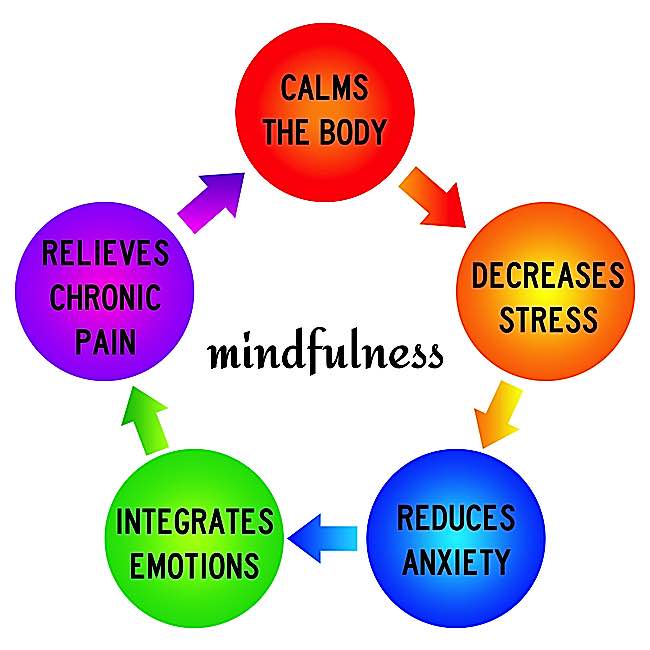10 reasons meditation benefits students (and, the rest of us): citations from experts and studies
Meditation can offer many benefits to people of all ages, including students. Daily practice will help students to remain healthy and improve their wellbeing. Here are ten reasons why meditation is worth the time and effort.
1. Improved Focus and Academic Performance
One of the key benefits of regular meditation is that it improves focus. By doing some meditation each day students will be able to improve their concentration span and alertness. Meditating allows for an increase in the creative thinking, practical intelligence and IQ functions of the brain. The result will be a student who has improved academic results.
This has been observed by Beauchemin et al (2008) particularly with students who had learning disabilities. Specifically, they found that “all outcome measures showed significant improvement; participants showed decreased state and trait anxiety, enhanced social skills, and improved academic performance (…) mindfulness meditation decreases anxiety and detrimental self-focus of attention, which, in turn, promotes social skills and academic outcomes.” [1]
2. Reduced Stress Levels
As a result of regular meditation, students are able to reduce their stress levels and develop greater alertness. They also have better resistance to the effects of stress during times of exams. Meditation helps students to develop the skills to calmly and peacefully confront and tackle stressful situations as they arise.
According to Chételat et al (2018) “meditation training for stress reduction and emotional and attentional regulation would benefit mental and brain health and well-being.” [2]

3. Improved Brain Efficiency
By engaging in daily meditation, students are able to develop their ability to recall information and to problem-solve more quickly and easily. Meditation also helps to improve decision-making abilities.
A study by Colzato et al (2014) showed that “focus-attention meditation tends to support convergent thinking, the process of generating one possible solution to a particular problem” [3]

4. Reduced Chances of Depression and Anxiety
Students regularly encounter stressful situations which can predispose them to depression and anxiety. However, meditation can help.
Parmentier et al. (2019) found that “mindfulness, dispositional or enhanced through meditation, can improve well-being by reducing symptoms of depression and anxiety, and that healthy emotional regulation is an important mediator of this effect.” [4]
A randomized controlled trial of mindfulness meditation for generalized anxiety disorder (GAD) by Hoge et al. (2013) revealed that “mindfulness meditation training, in the form of mindfulness-based stress reduction (MBSR), can reduce anxiety symptoms in patients with GAD even when compared to an active control condition, and is a treatment option worth pursuing in larger investigational trials. (…) Patients who learned mindfulness meditation had improved coping during a laboratory stress paradigm, raising the possibility that mindfulness may imbue some resilience to stressful psychological challenges”. [5]

5. Improved Self-Confidence
Throughout their studies and adult life, students will face situations in which they have to confront public speaking situations. For some students who lack confidence, these situations can be nerve-wracking and cause anxiety. Yet meditation can support students to develop their self-confidence, as well as help them to develop a more optimistic and assured mindset when approaching new challenges or different ways of working.
A study focusing on clinicians’ well-being by Olson et al. (2014) indicated that their “mindfulness and self-compassion are relevant skills and qualities for well-being and confidence in providing calm, compassionate care.” [6]

6. Reduced Chances of Developing Addiction
Students can find themselves on the wrong pathway or under the influence of poor company for a multitude of reasons. Meditation can provide students with the skills they need to develop the confidence to refuse and to resist bad habits with greater ease.
An article by Garland et al. (2018) states that “mindfulness-based interventions (MBIs) have been studied as a treatment for an array of addictive behaviors, including drinking, smoking, opioid misuse, and use of illicit substances like cocaine and heroin. (…) MBIs are some of the newest additions to addictions treatment. It is perhaps no coincidence that the rise of MBIs has been co-incident with advances in the neuroscience of substance use disorders.” [7]

7. Improved Personal Transformation
Meditation can have a truly transformational effect on students. Amongst its many benefits, meditation helps to improve students’ self-esteem, which helps to create students who are outspoken, confident and happy in themselves. As a result, students find that they can handle difficult situations and peer pressure more easily. Students also learn to be more patient and develop better listening skills. Consequently, they are better equipped to create positive relationships with others and are better prepared to learn new things.

8. Reduced Absenteeism
One of the key factors in ensuring that a student is able to achieve academic success is ensuring that they are in class. Meditation helps to improve a student’s overall health and wellbeing meaning that they are less likely to be absent from school. Similarly, due to the calming benefits of meditation, students who practice it regularly are able to develop greater self-control and a positive mindset. This helps to promote good, positive behavior and results in lower levels of behavior incidents at school.
An example with working professionals by Trace Crouch shows that “absenteeism costs the public sector a lot and giving people mindfulness training could save money in the short and long term.” [8]

9. Lowered Risk of Disease
Meditation equips students with the skills needed to abolish negative thoughts. In this way, meditation enables students to combat a number of diseases such as anxiety, depression, and stress (as mentioned above). The other disease states it can help lower the risk of include blood pressure, pain, irritable bowel syndrome, and ulcerative colitis. [9] It also helps to improve students’ overall wellness.

10. Promotes Happiness and Wellbeing
Zen et al. (2015) performed a study that confirmed that “loving-kindness meditation (LKM) interventions could enhance positive emotions in daily life and that the on-going practice of LKM could provide short-term positive emotions.” [10]
Meditation allows students to focus on their goals and keeps their minds active and alert. They are able to push negative thoughts away and as such develop a happier, more cheerful disposition and outlook on life. In short, they become happier, more confident individuals.
Aimee Laurence is a blogger at Paperfellows.com and Academized.com websites. She specializes in writing about issues affecting students and topics regarding college life. Aimee is also a freelance HR at Custom Essay portal.
NOTES
[1] Beauchemin et al. (2008). Mindfulness Meditation May Lessen Anxiety, Promote Social Skills, and Improve Academic Performance Among Adolescents With Learning Disabilities. Journal of Evidence Based Integrative Medicine. Retrieved from https://journals.sagepub.com/doi/abs/10.1177/1533210107311624
[2] Chételat et al. (2018). Why could meditation practice help promote mental health and well-being in aging? Alzheimer’s Research & Therapy. 10:57. Retrieved from https://www.ncbi.nlm.nih.gov/pmc/articles/PMC6015474/
[3] Colzato et al. (2014). Prior Meditation Practice Modulates Performance and Strategy Use in Convergent- and Divergent-Thinking Problem. Volume 8, Issue 1, pp 10–16. Retrieved from https://link.springer.com/article/10.1007/s12671-014-0352-9
[4] Parmentier et al. (2019). Mindfulness and Symptoms of Depression and Anxiety in the General Population: The Mediating Roles of Worry, Rumination, Reappraisal and Suppression. Frontiers in Psychology. 10:506. Retrieved from https://www.ncbi.nlm.nih.gov/pmc/articles/PMC6418017/
[5] Hoge et al. (2013). Randomized Controlled Trial of Mindfulness Meditation for Generalized Anxiety Disorder: Effects on Anxiety and Stress Reactivity. Journal of Clinical Psychiatry. 74(8): 786–792. Retrieved from https://www.ncbi.nlm.nih.gov/pmc/articles/PMC3772979/
[6] Olson et al. (2014). Factors Associated With Well-being and Confidence in Providing Compassionate Care. Journal of Evidence Based Integrative Medicine. Retrieved from https://journals.sagepub.com/doi/full/10.1177/2156587214539977
[7] Garland et al. (2018). Mindfulness-based treatment of addiction: current state of the field and envisioning the next wave of research. Addiction Science & Clinical Practice. 13:14. Retrieved from https://www.ncbi.nlm.nih.gov/pmc/articles/PMC5907295/
[8] Booth, R. (2015). Meditation may prevent absenteeism by stressed public servants, MPs claim. Retrieved from https://www.theguardian.com/lifeandstyle/2015/jan/14/meditation-help-stressed-public-servants-mps-inquiry
[9] National Center for Complementary and Integrative Health. (n.d.). Meditation: In Depth. Retrieved from https://nccih.nih.gov/health/meditation/overview.htm#hed3
[10] Zeng et al. (2015). The effect of loving-kindness meditation on positive emotions: a meta-analytic review. Frontiers in Psychology. 6:1693. Retrieved from https://www.ncbi.nlm.nih.gov/pmc/articles/PMC4630307/
1 thought on “10 reasons meditation benefits students (and, the rest of us): citations from experts and studies”
Leave a Comment
More articles by this author
Search
Latest Features
Please support the "Spread the Dharma" mission as one of our heroic Dharma Supporting Members, or with a one-time donation.
Please Help Support the “Spread the Dharma” Mission!

Be a part of the noble mission as a supporting member or a patron, or a volunteer contributor of content.
The power of Dharma to help sentient beings, in part, lies in ensuring access to Buddha’s precious Dharma — the mission of Buddha Weekly. We can’t do it without you!
A non-profit association since 2007, Buddha Weekly published many feature articles, videos, and, podcasts. Please consider supporting the mission to preserve and “Spread the Dharma." Your support as either a patron or a supporting member helps defray the high costs of producing quality Dharma content. Thank you! Learn more here, or become one of our super karma heroes on Patreon.
Aimee Laurence
Author | Buddha Weekly
Aimee Laurence is a blogger at Paperfellows.com and Academized.com websites. She specializes in writing about issues affecting students and topics regarding college life. Aimee is also a freelance HR at Custom Essay portal.















A lovely, inspiring article. I could read it again and again.